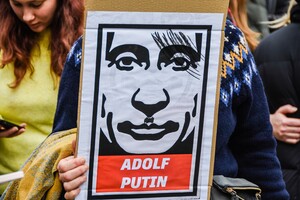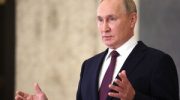The Russian invasion of Ukraine is reminiscent of the horrors of the 1930s and 1940s, but also destroys many myths about those times.

Mighty Russia with numerical superiority, better weapons and greater economic power could not only win, but at least gain something in 7 weeks of invasion of Ukraine.
But in the 1940s, in just 5 weeks, Germany was able to occupy most of Western Europe, defeat France, and force a well-armed British army to flee. It seemed that the German army was the strongest in Europe. At the same time, a new way of fighting appeared – the so-called “blitzkrieg”. It was believed that Germany had a technological and numerical advantage. But it was a myth.
The German army desperately improvised because of a justified feeling of inferiority: they knew that Britain and France would win the long war. The Germans resorted to methods familiar to them since 1918. But then why did they win and the Russian army fail? Cambridge University history professor Robert Thombs writes about this in The Telegraph.
During World War II, every country in Europe was divided. There were political factions everywhere that opposed the war. They were driven by fear and sometimes passive fascination with fascism as a more acceptable alternative to communism. With the German offensive, anti-war groups, sometimes uniting the left and the right, dreamed of seizing power and becoming “collaborators,” helping the German army consolidate its conquests. Today, like an alarming echo of the 1930s, very similar voices of right and left radicals blame the West for the start of the war and even mention the British Empire to prove that the Western world is no better than Vladimir Putin. Now, as then, their goal is to demoralize and split public opinion for their own useful motives. So far, such votes have not been successful. And compared to the catastrophic 1930s, modern democracies are consolidated and determined.
Read also: Is Putin the new Hitler, and then who are the Russians?
But perception is very important. The Nazi regime, through propaganda, NSDAP conventions, brutal intervention in the Spanish Civil War, and the infamous Olympics in Berlin, was able to create an image of an irresistible dynamic and modern force. And this image surpassed the real German possibilities. He was both scary and impressive, even attractive to many. Progressive politicians vehemently opposed rearmament and accused the West of fascist aggression. Many of them condemned liberal democracy as decadent and weak. Some spoke of the high virtues of dictators. An influential Labor MP once called Adolf Hitler a “peaceful vegetarian.” The realists wanted to submit to what they thought was inevitable. Consequently, they promoted a policy of “favoritism” by throwing Czechoslovakia, which Ukraine plays today, under the train. And then in 1939 nothing was done to help Poland. Many politicians in the West had white flags in their hands long before the battles began.
According to the historian, the great difference between the Second World War and the events now is the patriotic determination of the people of Ukraine. Tombs admits that, like many other observers, he expected Ukrainians to shudder at Russian force. And finally, there will be a government of collaborators who will carry out the will of Putin's dictatorship. But in reality, even cynical Russians have failed to create a puppet regime.
“Where do Ukrainians get such courage? Will we be able to match her today? How much, after all, depends on several personalities, as was the case in the 1940s? If Volodymyr Zelensky had not discovered Churchill's spirit or had he been killed, would the resistance have been as effective? Britain in 1940 could easily have surrendered. Proponents of favoritism tried to remove Churchill and asked Mussolini to help make a deal with Hitler, “the historian wrote.
French soldiers fought until Marshal Philippe Pétain announced a truce on the radio. If the Ukrainian government even hinted at capitulation, would the Ukrainians continue to resist? Leadership matters. Putin's Russia is not as scary and unattractive as Hitler's Germany. Few consider it the power of the future. Although the West is alarmed by its imperfections, it is far from divided or intimidated. Unlike Neville Chamberlain in Munich, where British threats forced the Czechs to abandon self-defense, Boris Johnson did the right thing when he listened to his defense minister, Ben Wallace, and began handing over weapons to Ukraine. These weapons helped destroy Russian armored vehicles and protect Gostomel. This marked the beginning of Putin's blitzkrieg. If this did not happen, would the Russians be able to capture Kyiv, like the Nazis once did Paris?
Read also: In the best traditions of Hitler: Russia can send to war “Unarmy” – teenagers
The Russian army did not regain the initiative. She was stuck during the First World War. Should this surprise anyone? Russia's strength has been exaggerated for more than 100 years, especially after the success of its army in the battle with the Wehrmacht. In general, this is the only military victory of Moscow in modern times. But it still influences the way the world views Russia, providing it with the laurels on which its nationalism and militarism are based. Communists in the West spoke enthusiastically about the exploits of the Red Army. The belief that it was the Russians who defeated Hitler became commonplace. But recent research suggests that the Eastern Front played a minor role in German military efforts. He was not given significant resources. The Air Force did not cover the ground offensive, as in the battles against Britain and America after the landing in Normandy. The Red Army defeated a mortally weakened enemy, using a large number of often intimidated soldiers as cannon fodder.
Their victory was disgraced by the mass rape of German women, violence against civilians and looting. Somehow this was justified by anger and retribution for all the crimes of the Nazis in Eastern Europe. But what about modern Ukraine, where Russian soldiers commit the same crimes? Moreover, all this was done by the Russian tsarist army in 1914 in Western Europe. A culture of extreme cruelty is deeply ingrained in the Russian army, in which officers either encourage war crimes or sneeze at them. Hitler's tanks could have been stopped with a more consolidated and skilful defense in 1940. The Nazi leader himself feared this, temporarily firing General Heinz Guderian for advancing too quickly. Hitler would not have been defeated in a very unpopular war. But no one stopped the tanks. So Hitler was able to destroy Europe with impunity for almost five years. ” And if we are lucky, other potential aggressors will remember it, “the historian wrote.
See the special topic: We do not hear a response from Russia to the proposal to exchange residents and defenders of Mariupol – Zelensky The situation in the city remains unchanged – as severe as possible. Ukraine received combat aircraft and spare parts for aircraft repairs The United States said that the United States did not transmit fighters directly. The United States is working on arms supplies to Ukraine at an “unprecedented rate” – the Pentagon The process of obtaining permission to ship equipment has been reduced to 48-72 hours. Germany is looking for weapons that can be delivered to Ukraine as soon as possible – Scholz The European Union will give up Russian energy resources. The United States may announce new sanctions against Russia this week World leaders also discussed joint efforts to put economic pressure on Russia.


